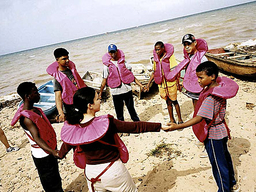UMBC Eminent Scholar Mentor Program
Location
The Commons : 329
Date & Time
February 8, 2017, 4:00 pm – 5:30 pm
Description
Vanessa Pérez Rosario, Ph.D.
Associate Professor
Department of Puerto Rican and Latino Studies
at Brooklyn College, City University of New York.
"Beyond Boat People: Marginalization and Mobility in the Caribbean”
The 1960s Universal Declaration of Human Rights confers subjecthood upon every human being. Although human rights law offers the promise of international citizenship, it relies on nation-states to recognize and confer those rights. The question, of course, is what happens to the people who are stateless? There is a disjuncture between the human rights Universalist vision and the sites of social and legal recognition. At the crossroads of several major routes of unauthorized migration in the Caribbean, Central, South and North America, Puerto Rico has become the second most popular point of entry for smuggling to the U.S. territory after the Southwestern border with Mexico. The heightened criminalization of borders, bodies, and populations and constrained mobility are intimately tied to the precarity of personhood via notions of illegality, representational economies, and dispossession.
Latin@ Imaginaries: Borders, Belonging, Citizenship examines unauthorized migration, human rights, and the role of aesthetic production in defining social and political belonging. Cultural production can offer powerful counter-narratives to the sensationalized violence and the criminalized representations of undocumented migrants in the media. Works such as Mayra Santos Febres’ collection of poetry Boat People (2003), Ana-Maurine Lara’s novel Erzulie’s Skirt (2006) and Sherezade Garcia’s art project Sabana de la Mar (City of the Drowned): Salvation Action (2003), imagine the Caribbean sea as a liquid border, and Puerto Rico a different kind of frontier and entry point to the United States. At the intersection of art and activism, writers, artists, musicians, and filmmakers on both sides of the border bring attention to the victims; challenge their invisibility; and shed light on structural inequalities, social injustices, and state violence. Beyond a narrow focus on migration, this project explores borders, belonging, and citizenship. I am interested in theorizing the way that literary and visual art are able to reconstitute the subject and render it recognizable, and to imagine the humanities, and more broadly culture, as a site of advocacy in the twenty-first century.
